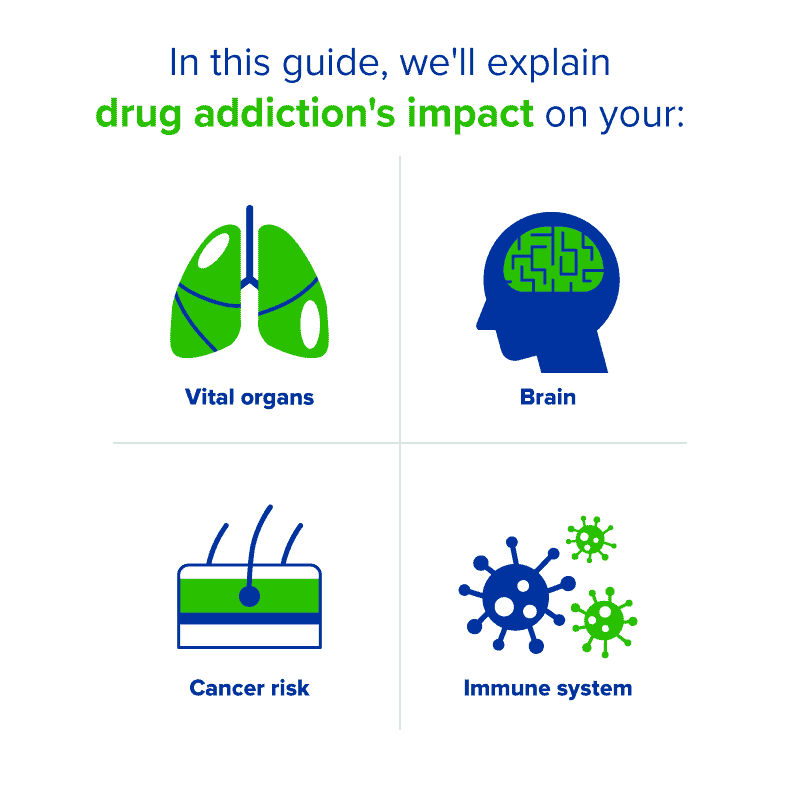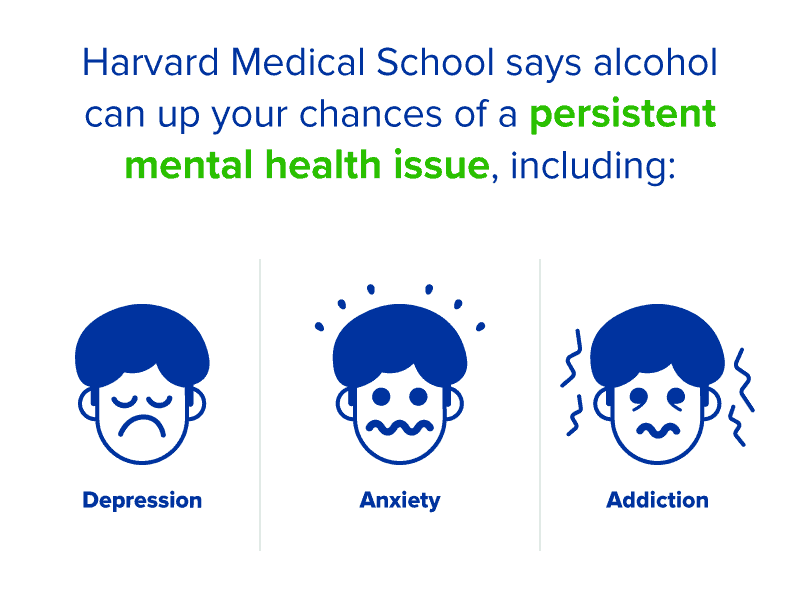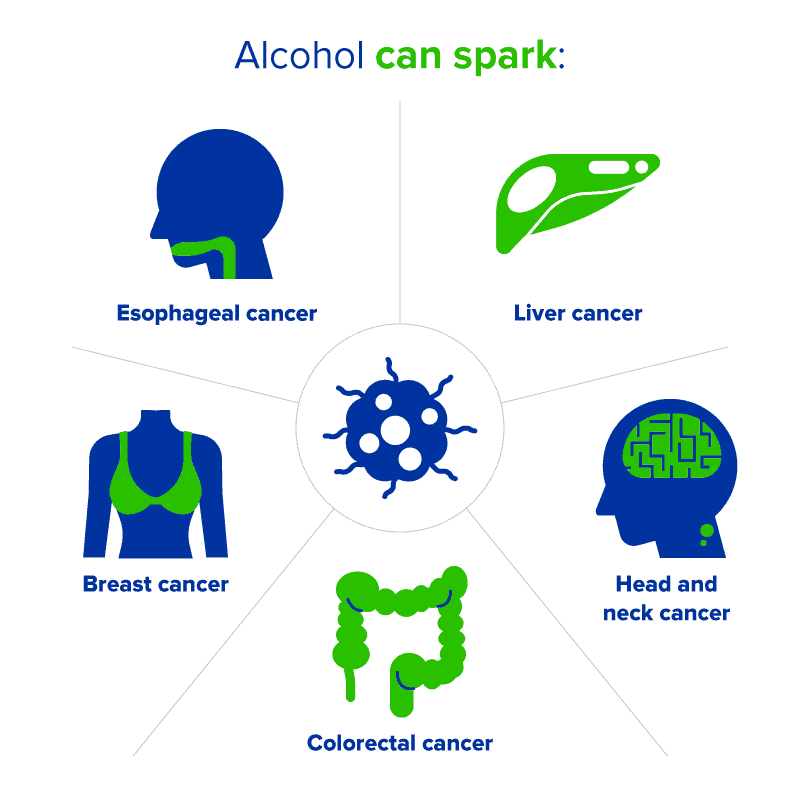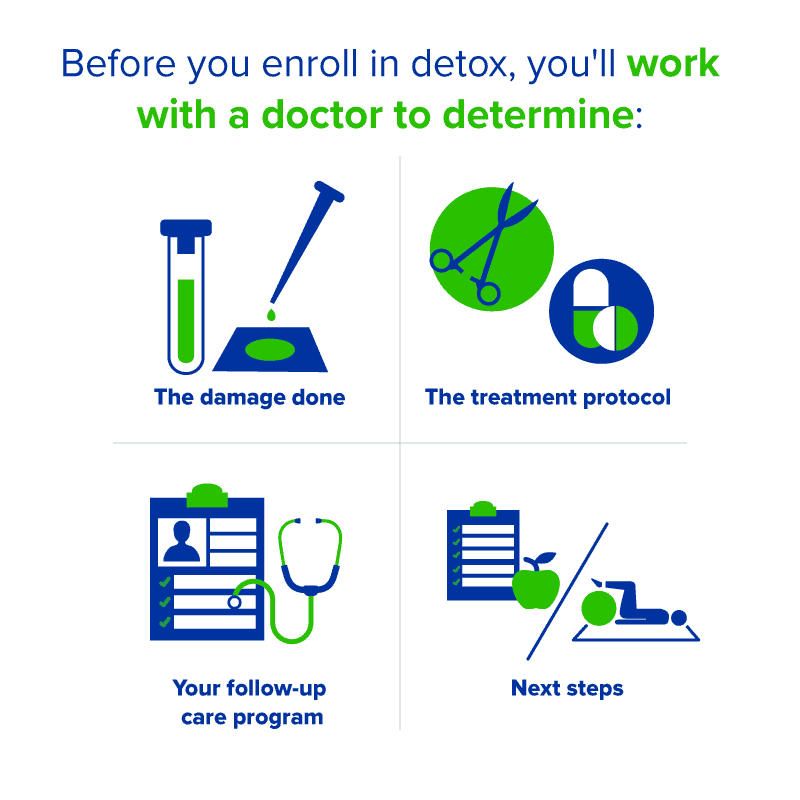You know addictions harm your relationships. Every time you get into a fight with the people you love because of your drug use, you’re reminded of that.
You also know that addictions hurt your finances. You probably pay your bartender or dealer more than you pay almost anyone in your life.
But your addictions can also harm something else that’s vital to your future.
Addictions can harm your body.

- Vital organs.
- Brain.
- Cancer risk.
- Immune system.
We’ll also explain how drug damage can intertwine with age-related changes and drag your health down further.
We don’t share this to scare you. We hope to encourage you to get treatment. We’ll explain how treatment teams address physical damage caused by drug use, and we’ll discuss how relapse could be even more dangerous if you have a medical problem.
Substance Abuse & Your Organs
Think of your organs as the unsung heroes of your body. They pump your blood. They take in air. They clean out toxins. They do all their work without complaining, each and every day. You need your organs to process addictive substances, and each hit you take can damage them.
Alcohol is among the most organ-damaging substances you can put into your body. According to the National Institute on Alcohol Abuse and Alcoholism, alcohol abuse can harm your:
- You can develop an irregular heartbeat, and your blood pressure can rise and rise. Let this last for too long, and your heart muscle can stretch and droop. If your heart can’t pump effectively, your blood pools. If it clots, that could lead to a stroke.
- This small organ processes every sip you take, and during digestion, toxins form. They can harden or kill off liver tissue, and fat or scars replace those healthy cells. Your liver can’t work effectively when it’s hindered by damage.
- This organ also helps to process alcohol digestion, and toxins can harm it. When the pancreas is damaged, it swells. That can prevent proper absorption of anything, including alcohol.
Drink too much alcohol, and you can lose consciousness. You can also pass out if you take too much heroin, prescription painkillers, or benzodiazepines.
When you’re unconscious, you don’t swallow properly, but you can still vomit. If you pull vomit into your lungs with your next breath, it can spark pneumonia in the lungs. Aspiration pneumonia, as this condition is known, is the most common pulmonary problem related to drug use, researchers say.
Alcohol isn’t the only substance that can harm your organs directly. Researchers say crack cocaine use has been linked to:
- Pneumonia.
- High blood pressure.
- Hemorrhages.
- Emphysema.
Some of these problems are linked to cocaine absorption. Others are caused by additives (like talc) that dealers put in crack cocaine to make more money while fooling their buyers.
Cocaine can also make the heart race, and each beat can cause tiny tears. You may not feel them when they happen, but if you have too many, they can add up to a muscle that doesn’t work as well as it should.
Researchers say a large portion of cocaine abusers are living with heart damage, but they just don’t know it. Each dose could be their last, and they may have no idea they’re in trouble.


Substance Abuse & Your Brain
Your brain cells control everything from your breathing to your personality. Your mind is the seat of who you are as a person, and it’s protected by a thick layer of bone to keep contamination out. But brain cells are the target of most addictive drugs, and the damage they do can linger.
Consider alcohol. Each sip you take crosses from your stomach into your bloodstream and then into your brain. Once there, it can cause judgment lapses. You might say and do things you’d never do if you were sober.
But Harvard Medical School says alcohol can up your chances of a persistent mental health issue, including:
- Your brain cells are awash in pleasure chemicals when you drink. When you’re sober, they have no access. You could feel low and sad between your sips.
- Alcohol dampens electrical activity in the brain, and that’s why you feel calm and sluggish when drinking. When it wears off, and your brain comes back to life, you could feel incredibly nervous. Some people stay in that state permanently without treatment.
- A dependence on alcohol is a brain disease. Your cells can’t function without a hit of alcohol, and it’s not a situation you can think your way out of without help.

Substance Abuse & Cancer
Few diseases cause more fear than cancer. Your cells grow in unpredictable and out-of-control ways, and the treatments used to cure cancer can make you feel terrible. Some therapies seem even worse than the cancer itself. Most people will do all they can to keep cancer from touching their bodies, but if you abuse substances, you could develop this difficult problem.
Alcohol is closely related to cancer. The National Cancer Institute says light drinkers (people who have no more than one drink per day) have a moderately increased risk, but those who drink heavily take bigger chances. Alcohol can spark:
- Esophageal cancer. Alcohol burns down the throat, causing damage to each cell it touches. That injury must be repaired, and small coding errors can lead to cancers.
- Liver cancer. Heavy drinking increases your risk of cancer twofold, the National Cancer Institute
- Breast cancer. This form of cancer is related to genetics and lifestyle. But researchers also say that drinking plays a role, including light drinking.
- Colorectal cancer. Moderate consumption sparks your risk of this cancer. You may not notice symptoms until it’s hard to treat the problem.
- Head and neck cancer. Your mouth, throat, and voice box are common targets of alcohol-related cancers. If you smoke while you drink, the risks are even bigger.

Marijuana, researchers say, is one of those drugs. Researchers aren’t sure why marijuana seems to help tumors grow, but they think it has to do with micro-cell changes that accumulate with time until they build up enough to allow a tumor to form and then grow.
Drugs you inject can also increase your cancer risk, especially if you share needles. It’s not at all uncommon for people to slip a needle out of their bodies and hand it to another. It seems like a kind gesture. But that tip could contain a drop of blood that’s contaminated by hepatitis.
Hepatitis C, the Dana-Farber Cancer Institute explains, increases your risk of developing chronic infections. They can scar up your body, and all of that tissue repair increases your chances of coding errors and tumor formation.
Substance Abuse & Your Immune System
Every cell in your immune system works hard to protect you from invaders. Those cells surround and destroy pathogens before they can take hold and multiply. You need that system to operate at peak power, so you don’t get sick when you don’t need to. But some drugs can hinder or even damage your immune system.
Alcohol, says the National Institute on Alcohol Abuse and Alcoholism, can put your immune system on hold. You’ll be at increased risk of developing diseases like pneumonia and tuberculosis. You could also get pesky, smaller infections like colds and the flu more often than someone who doesn’t drink.
Share your needles while taking other drugs, and you can also develop HIV. This disease destroys your immune system, and without treatment, it could cost you your life. The organization Advert says about 35.4 million people have died of AIDS since it was first detected, and of everyone who has the disease now, about 25 percent don’t know it.
Drug use can block your ability to keep appointments and manage your health. You might also avoid talking openly with your doctor about what you do and how you feel. Both of those factors could keep you from a diagnosis and a shot at healing.
Your Risks Increase With Age
When you’re in your 20s and 30s, you think you’ll live forever. But as your 40s and 50s begin, you may start to see troubling changes. By your 60s, you know your youth is behind you. If you use drugs consistently throughout this time period, the damage could be hard to cope with.
Mayo Clinic says aging can affect the function of your:
- Blood vessels and arteries stiffen, and that makes your heart work harder to pump blood.
- The walls stiffen with age, and the muscles around the bladder can weaken and lengthen.
- Your cells change, and you may have less blood flow to delicate tissues.
We’ve already explained how drug use can harm these same systems. If you keep drinking and taking drugs while your body is under siege from age, you’re doubling the damage done.
It can be harder for your body to repair damage as you age. Researchers say that you have fewer cells making up your organs with each birthday you celebrate. You may not notice the changes, but as cell numbers dip, your ability to knit back together after an injury disappears. All the harm you do could persist.
Does Treatment Help?
You know that ongoing drug abuse hurts your body. There is good news. While you might need time and medical care to recover, many of the illnesses we’ve mentioned here are treatable. And addiction care can help you gain control of your use so you don’t allow the damage to continue unchecked.
Detoxification begins the treatment process, and as experts explain, it doesn’t involve medical care for underlying conditions. Instead, detox is about helping your body process all the leftover toxins from the drugs you took. Your team might use medications, therapy, or both to help you move from intoxication to sobriety. And then you build on your success in a treatment program.
But your team won’t want to ignore your physical health. Before you enroll in detox, you’ll work with a doctor to determine:
- The damage done. Blood tests, imaging scans, and other screening tests can help your team figure out just where you need help.
- The treatment protocol. You might need some therapies (like heart bypass surgeries) right away. Others (like medications for HIV) can be given over time.
- Your follow-up care program. Your doctors will need to monitor your progress and ensure you’re getting better. That typically happens in appointments.
- Next steps. When you’ve moved through a medical crisis, you might have more work to do to fully recover. You might need physical therapy or nutrition therapy, for example. Your team should outline that for you, so you know what comes next.

Relapse Risks Are Heightened
Few people want to talk about their illnesses and medical care. It’s a little embarrassing, especially if your problems began due to drug use. But your treatment team will need to know what’s happening and what’s expected to keep you safe.
When you have an illness due to drug use, you can’t afford to relapse. That next hit of cocaine could be too much for your damaged heart, or that shot of alcohol could undo the months of chemo you did for esophageal cancer.
Getting better means protecting your health for the long term. You and your treatment team can make that happen.




